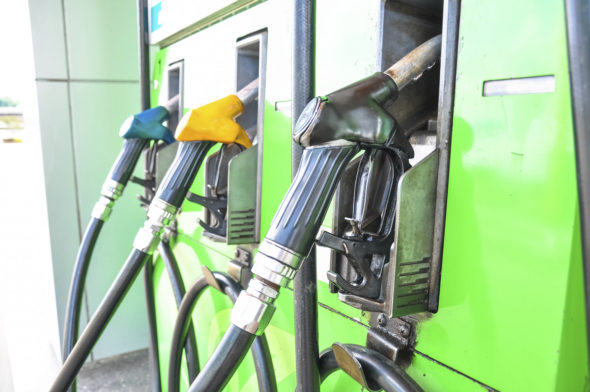Thanks to growing environmental concerns and economic forces, 97% of fuel currently pumped in the U.S. is up to 10% ethanol. For a few reasons, ethanol in gas is a hot-button issue for some folks; search for an article on the topic and your chances of finding one that balances both sides of the aisle are pretty slim. But, while many drivers are familiar with Flex Fuel vehicles, which run on a fuel made of 85% ethanol, fewer realize that the gasoline they’re already putting in their cars is partially made from corn.
To find out how consumers stand to benefit from even more ethanol in fuel, we spoke with Growth Energy’s CEO, Emily Skor, and Dr. Andy Randolph of Richard Childress Racing. Currently, most gas sold in the U.S. is capped at 10% ethanol—something known as the “blend wall.” There’s no argument that E15—gasoline with 15% ethanol content—is on its way, however. The EPA has already approved it, and our country’s Renewable Fuel Standard puts pressure on refiners to increase the industry’s use of biofuel alternatives. The question now is whether or not the increased prevalence of ethanol in our fuel is a good for consumers.
First, here are some of the basic “fun facts” surrounding ethanol:
- Adding ethanol to gasoline increases its octane rating. A gallon of regular, unleaded gas on sale today has an octane rating of 87. E15, on the other hand, pushes that number up to 88. Premium gas sits anywhere from 91 to 94 octane, but E85 Flex Fuel is in the 100-105 range.
- Ethanol burns cooler and cleaner than regular gasoline. Adding more ethanol to gasoline would hypothetically reduce emissions.
- Currently, ethanol is cheaper than gasoline, so increasing ethanol from 10 to 15% should save you some money when you fill up.
On the other hand, there are some “not-so-fun facts,” too:
- Ethanol produces 33% less energy than gasoline—which translates to a 1.67% reduction when moving from E10 to E15. You’ll probably get a gallon of E15 cheaper than your standard gallon of E10, but you’ll also travel fewer miles on that gallon.
- Because ethanol aggressively attracts water, E15 isn’t suited for small engines—particularly those powering watercraft. It also hasn’t been approved for cars older than 2001.
Right now, 10.3% of cars listed on CarGurus are FFVs. When asked whether Growth Energy, an interest group focused on expanding the country’s adoption of ethanol-enriched fuel, would rather see widespread distribution of E85 Flex Fuel or E15 regular gas, Emily Skor responded, saying:
“We want consumers to be able to pick the option that best fits their budget and their vehicle. Today, there are more than 19.3 million Flex Fuel Vehicles (FFVs) on the road—saving drivers money and improving engine performance every day. But that’s just one portion of the nearly nine out of 10 cars on the road approved to use E15—any model since 2001, according to the EPA. Every driver should have the chance to fill up on the option that will deliver more miles per dollar, maximize performance, and help keep the air clean.”
Right now, E15 is available and clearly labeled, but you’ll have to search for it (alternatively, you can use this tool). The Boston area has only 5 ethanol gas stations, and all five sell only E85 Flex Fuel. Head down south, and E15 is a bit more prevalent. There are certainly some benefits to ethanol—better, cleaner performance (NASCAR switched over to E15 due to its lower emissions and has enjoyed the increase in power)—but the drawbacks exist, too (namely the hit to fuel economy), and it’s not the right fuel for everyone. So, the next time you fill up your tank, be sure to check the label!
Would you like to see more ethanol added to regular gasoline?
-Matt Smith
Find Certified Pre-Owned Cars and Used Cars in your area at CarGurus.
Shopping for a new vehicle?
Bring along CarGurus’ mobile app to help check prices, find good deals, and research cars on your smartphone.
from The CarGurus Blog http://blog.cargurus.com/2016/11/08/the-truth-about-ethanol
via Car Gurus

No comments:
Post a Comment